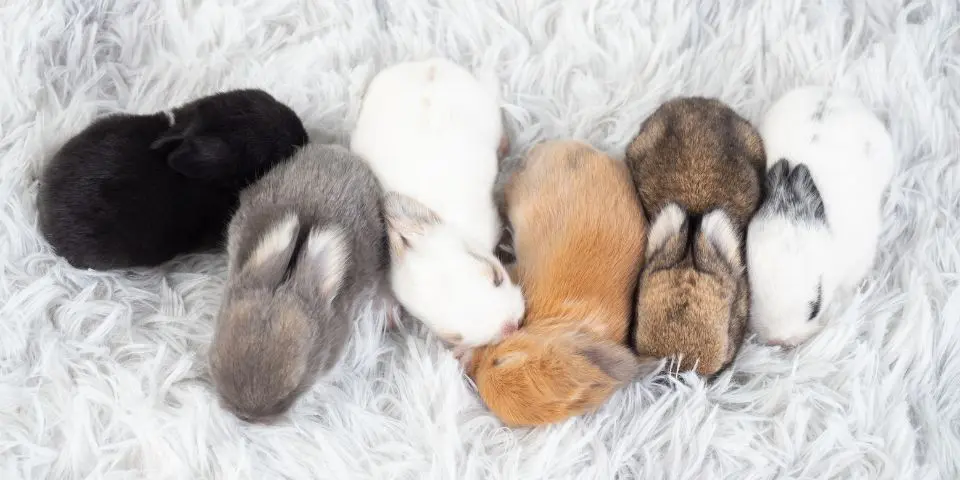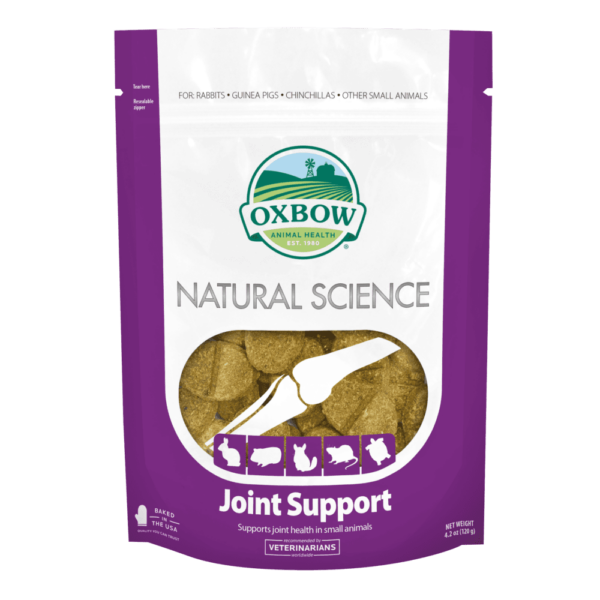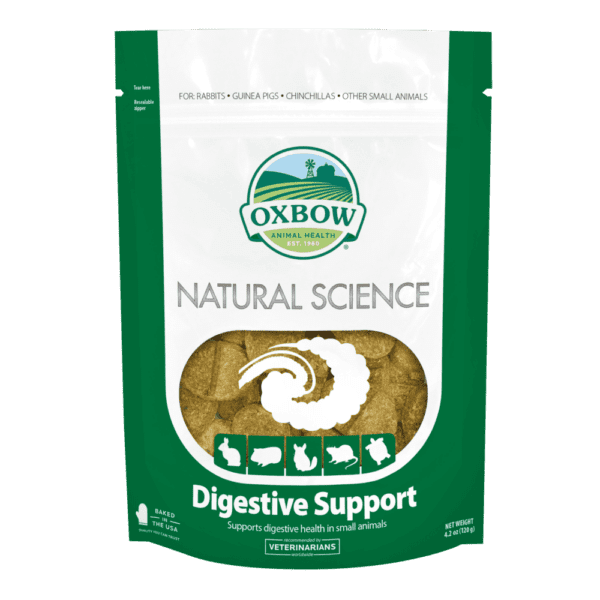by Dianne Cook, LVT, and Kellie Hayden
Updated: March 2, 2024
If you’re considering adopting a rabbit, it’s important to understand their lifespan and the different life stages these unique creatures experience. In this article, we’ll explore the following topics:
- The average lifespan of pet rabbits
- The unique life stages they go through
- How to properly care for them to support a long and healthy life
- Common health issues to be aware of
- How to support rabbits in their senior years
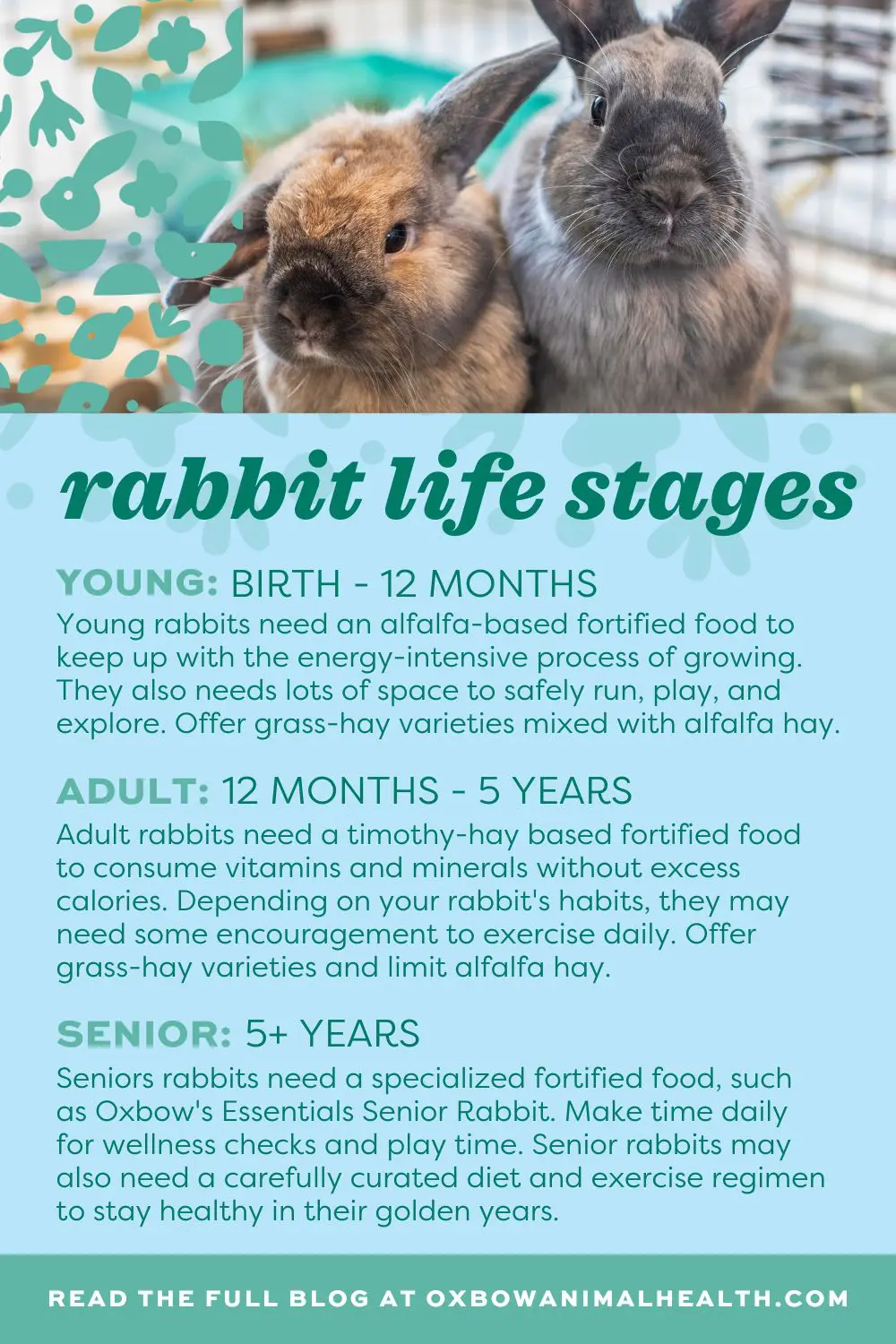
Average Lifespan of Rabbits
A rabbit’s life expectancy depends on many factors. Breed, genetics, diet, gender, living conditions, and consistent healthcare all play a role in determining lifespan. On average, most rabbits live 8 to 10 years, but through good nutrition and quality wellness care, many rabbits are living to see 11, 12, or even older. Similar to dog breeds, some larger rabbit breeds like the Flemish Giant may see reduced lifespans compared to their tiny counterparts like the Netherland Dwarf.
Also similar to other species like dogs and cats, rabbits mature at a faster rate than humans. Knowing that your little one will mature rapidly, you should have a plan in place to address their needs as they age.
Life Stages of Rabbits
Birth and Infancy Life Stage
Rabbits are considered “young” from about birth to 12 months of age, but the young life stage can be broken down further into “infancy” and “adolescence.”
Rabbits are considered to be babies or infants from birth to around 3 months old. During this stage of life, bunnies rely on their mother’s milk for nutrition. It’s vital to ensure the mother rabbit and babies alike have a nutritious diet, including an alfalfa-based fortified food and access to both alfalfa hay and a grass hay, during this time. A proper diet will help provide the necessary vitamins and minerals for your mother bunny to stay healthy, and will also provide the right nutrition for her babies’ growth and development.
Within the infancy life stage, baby bunnies are weaned from their mother at about 3-6 weeks of age. For a more specific timeline that’s appropriate for your new bunny family, make sure to work with a bunny-savvy veterinarian.
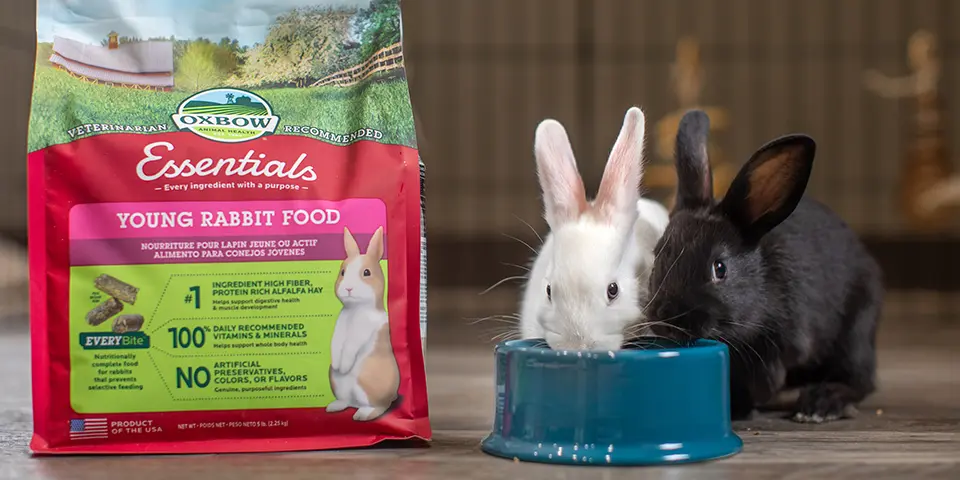
Juvenile Life Stage
Rabbits are considered to be juveniles from birth to about 12 months of age. When rabbits are considered adolescents, they’re between 3 – 6 months of age, and are considered teenagers between 6 – 12 months.
At this life stage, it’s vital to discuss spaying or neutering your bunny with a qualified veterinarian. Altering your pet provides many health benefits for your rabbit, but it should be done at around 3-6 months of age to provide the most benefit.
Some large rabbit breeds may age faster and leave the “young” life stage sooner than their smaller counterparts. They may be considered an adult at 9 months of age, for comparison. Make sure to have an exotics veterinarian visit scheduled for your rabbit when they are about 9-10 months of age, especially if they’re a larger breed. This appointment can help you and your vet know when your little one has reached adulthood and when you should transition them to an adult rabbit diet.
Nutrition
Rabbits grow and develop quickly during the young or juvenile life stage, and rapid development requires additional calories and nutrients. To meet these needs, continue feeding young rabbits a nutritionally complete, alfalfa-based fortified food. Alfalfa provides optimal protein and calcium to support healthy muscle and bone formation, as well as good amounts of fiber–something that all rabbits need for proper digestion and overall health, regardless of age.
While your youngster is still on the young food formula, we recommend feeding an unlimited quantity of pellets. The goal is to provide enough fortified food that there is always some available without giving your little ones the option to “gorge” themselves. This method helps ensure your bunny will get plenty of the micronutrients and protein they need during this phase of quick maturation without risking obesity early in life.
We also recommend offering young rabbits unlimited amounts of both alfalfa hay and grass hay (such as Western Timothy Hay or Orchard Grass Hay) to provide fiber, protein, and calcium. Eating a variety of hays also adds nutritional enrichment into a young rabbit’s daily routine, and will make for a much smoother transition to a grass hay-exclusive diet when your pet reaches adulthood. Offering a variety of grass hays also increases your pet’s exposure to different tastes and textures, which can help limit picky eating habits down the road.
Enrichment
Beyond focusing on diet, your young rabbit should have a large, safe area where they can live and play. Young bunnies are especially curious and active, and they need plenty of time outside of their enclosure to exercise and build strong, healthy muscles and bones.
Since rabbits can be litter trained, many rabbit parents allow their furry friends to free roam inside the home for at least a few hours each day. This however means tailoring human spaces to your bunny so they can safely play and explore.
At this life stage, young rabbits also begin to chew. If a pet parent isn’t careful this behavior can become destructive and may lead to electric cords, furniture, baseboards, and more becoming decorated with chew marks! If you opt to allow your bunny to roam freely, make sure your house is completely “bunny-proofed” before allowing them to do so.
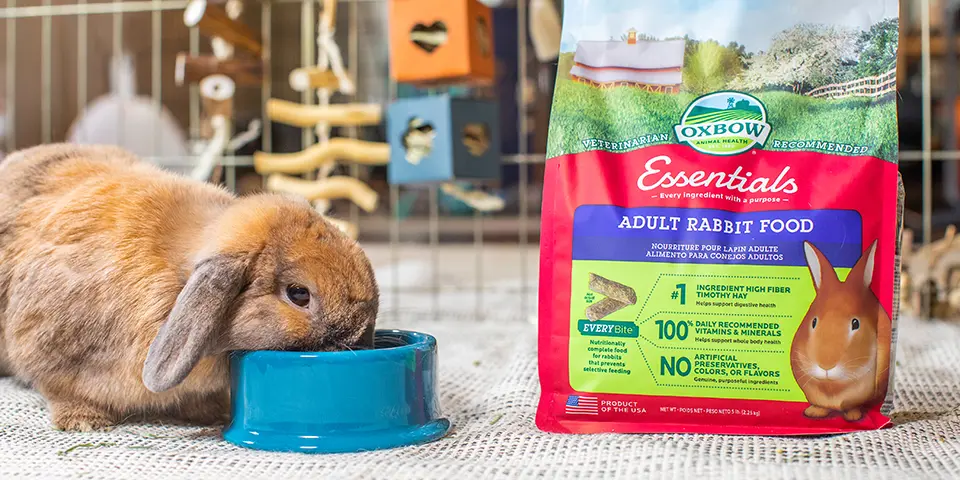
Adult Life Stage
Rabbits are considered adults typically between the ages of 12 months and 5 years of age (depending on breed). Though growth has slowed or ceased at the beginning of adulthood, adult rabbits still have specific nutritional requirements that should be factored into their care. Balanced macro-nutrients (such as fiber, protein, and fat) and micro-nutrients (like vitamins and minerals) are essential to ensure your furry friend maintains their good health.
Nutrition
Providing a controlled amount of high-quality, grass hay-based fortified pelleted food is a great way to ensure your adult bunny is getting all of their nutritional needs met. Though we encourage feeding an unlimited volume of pellets to young rabbits, always feed adult rabbits a measured volume daily based upon their ideal weight and body condition (refer to the back of your pet’s food packaging for proper measurements). This way, your friend gets the nutrients they need while you prevent them from overeating.
In addition to a fortified, high-quality adult pelleted diet, adult rabbits need a wide variety of grass hays fed in unlimited amounts.
Nutritionally, all of Oxbow’s grass-hay varieties (Western Timothy Hay, Oat Hay, Orchard Grass Hay, Organic Meadow Hay, and Botanical Hay) are very similar, and all will provide your companion with the essential fiber they need to keep their GI system running smoothly and their constantly growing teeth worn down to a healthy level.
While nutritionally similar, each hay variety has a unique flavor and texture profile, which in turn provides your little one with healthy nutritional and mental enrichment. Rabbits love to eat hay, but they also find comfort and enjoyment in using hay as nesting material, or even as something to nibble on while in their litter box, so ensure fresh hay is available to your little one at all times.
Enrichment
Once rabbits hit adulthood, their activity levels may decline with all of that “baby energy” gone. Adult bunnies may even gain a propensity for laziness. Because of this, adult rabbits should be consistently encouraged and provided opportunities to run, jump, and explore. Allowing your bunny time to stretch their legs and feed their natural curiosity through exploration gives them an additional source of physical and mental enrichment.
Be aware, however, that rabbits can become bored when exposed to the same environment day after day. Rearranging your rabbit’s habitat and all the various environments they may interact with can help reduce boredom. Simple actions such as providing a new hide-out, tunnel, or cardboard box can pique a bunny’s interest, as can the addition of new chew toys. The more your bunny can chew, hide, explore, and play, the happier they will be! For more enrichment ideas, check out some of our top toy and accessory recommendations for rabbits.
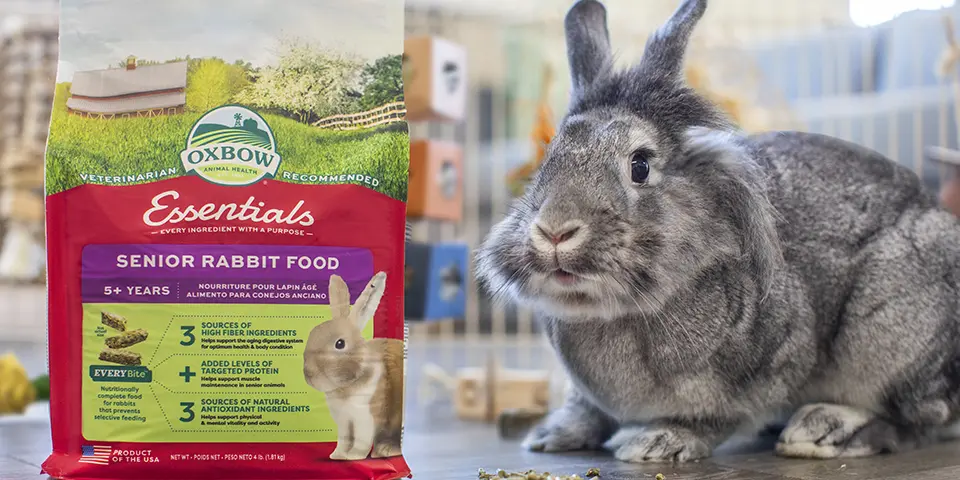
Senior Life Stage
While rabbits are all unique individuals, they generally ease into their “golden years” starting around 5 years of age. When it comes to our senior bunny friends, feeding suggestions should truly be focused on the individual pet’s overall health condition and observed health concerns. Always include your veterinarian in discussions related to your senior pet’s nutrition. They will be able to offer useful information to determine the overall nutritional profile that best suits your little one’s needs.
Nutrition
While not always the case, many senior rabbits tend to go one of two very opposite directions as they age; they either lose weight and muscle mass, or they become obese. Because of this, your pet will need a specialized diet in their older years. This diet, or any diet changes, should be made in collaboration with your rabbit-savvy veterinarian.
Once your senior bunny has had their annual wellness exam, and any bloodwork done checks out, have a discussion with your vet about the nutritional adjustments for senior rabbits outlined below. Any diet adjustments or transitions should be done gradually over the course of a few weeks.
If your pet is struggling to keep weight on: the gradual addition of young rabbit pellets to their existing adult rabbit pellets (up to and not exceeding a 50/50 ratio) while feeding loose grass hay varieties may help them maintain a healthy weight. Keeping them on an adult formula and supplementing with loose alfalfa hay may be a second option to approach weight loss. In some cases, a combination of the above may be used, or your veterinarian may suggest the inclusion of other calorie sources, like Critical Care, if your pet is prone to bladder sludge or stones and has needed to reduce their pelleted food intake to manage other health concerns.
If your pet is struggling with too much weight: consult with your veterinarian on steps you can take to either reduce calorie intake in small and safe ways (this may include a slight reduction of fortified food), or healthy ways to get your senior pet moving. This will likely include a full audit of your pet’s daily diet, as well as a discussion about what kind of exercise options are available to your pet. Also make sure to discuss the possibility of any underlying health conditions that may have flown under the radar. Because we have made many advances in exotic companion mammal medicine and care in the past few decades, conditions like arthritis are increasingly common as small animals life longer lives.
Depending on what you and your veterinarian decide is right for your bunny, it might be appropriate to transition your senior rabbit from an adult rabbit food to a senior rabbit food. Make sure to carefully go over any formula differences between adult and senior diets to help decide what is best for your pet.
Similar to an adult rabbit’s diet, your senior bun should have unlimited access to plenty of grass hay.
As rabbits age, you may also consider speaking with your trusted veterinarian about adding supplements to your pet’s daily regimen. Based on your pet’s overall health and any underlying health conditions, your veterinarian may suggest high-quality supplements to support areas such as urinary, skin and coat, joint, or digestive health.
Enrichment
Encouraging exercise at this stage of life is vital to your bunny’s health regardless of their weight, as it promotes mobility and helps sustain muscle mass and healthy joints.
Senior rabbits may develop physical changes and face new challenges as they age. Senior rabbits may experience weight loss, changes in appetite, and a decrease in activity levels. It’s important to be proactive in supporting your senior rabbit to ensure the best quality of life possible.
Regardless of your rabbit’s age, they are certain to add their quirky charm to your life. Proper nutrition, mental enrichment, and routine vet care are essential throughout every stage of your pet’s life. Ensuring their needs are met from babyhood through their senior years will help them experience the highest quality of life possible and will ensure their companionship in your life for many years to come.

